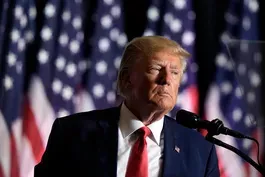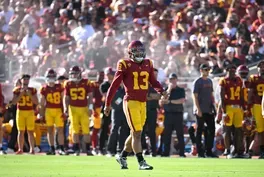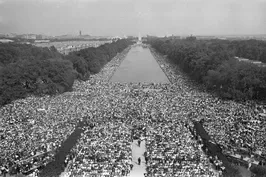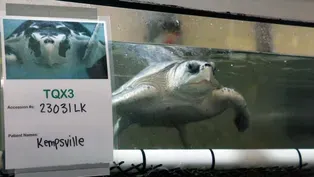
Tamara Keith and Errin Haines on Trump's trial date
Clip: 8/28/2023 | 9m 54sVideo has Closed Captions
Tamara Keith and Errin Haines on Trump's trial date and who's seeing a post-debate bounce
NPR’s Tamara Keith and Errin Haines of The 19th News join Amna Nawaz to discuss the latest political news, including the date set for former President Trump's federal trial and his Republican opponents hoping for some new attention from voters after the first debate.
Major corporate funding for the PBS News Hour is provided by BDO, BNSF, Consumer Cellular, American Cruise Lines, and Raymond James. Funding for the PBS NewsHour Weekend is provided by...

Tamara Keith and Errin Haines on Trump's trial date
Clip: 8/28/2023 | 9m 54sVideo has Closed Captions
NPR’s Tamara Keith and Errin Haines of The 19th News join Amna Nawaz to discuss the latest political news, including the date set for former President Trump's federal trial and his Republican opponents hoping for some new attention from voters after the first debate.
How to Watch PBS News Hour
PBS News Hour is available to stream on pbs.org and the free PBS App, available on iPhone, Apple TV, Android TV, Android smartphones, Amazon Fire TV, Amazon Fire Tablet, Roku, Samsung Smart TV, and Vizio.
Providing Support for PBS.org
Learn Moreabout PBS online sponsorshipAMNA NAWAZ: With the date set for former President Trump's federal trial, his Republican opponents are hoping for some new attention from voters and possibly a post-debate bounce.
Here to discuss it all are Tamara Keith of NPR and Errin Haines of the 19th.Amy Walter is away.
And great to see you both.
So, as you well know, the judge rejected Mr. Trump's request to delay the start of that trial until 2026.
We now have the trial date set for March 4 of 2024.
By that date, a few states will have already held their primaries or caucuses, but take a look at the calendar, because the very next day, if that March 4 date holds, is Super Tuesday.
And 15 more states will hold their primaries and caucuses, those shown in yellow right there.
So, Tam, when you look at that map and you look at what's at stake in this trial, do you see the trial having any impact on that day?
TAMARA KEITH, National Public Radio: Probably not, because Iowa and New Hampshire will have already happened, and the potential exists, if former President Trump, who has a prohibitive lead in all of the early - - all of the primary polls among Republicans, if he wins in Iowa and New Hampshire, Super Tuesday may not be that relevant.
And, also, it's not entirely clear that the that the trial date will stick, that that will be the date.
And if it is, it's the date that the trial begins.
So, what changes exactly by the time people are voting the very next day?
AMNA NAWAZ: Errin, what about you?
How are you looking at it?
Are there any states you would be keeping a particularly close eye on to see if that trial or any news that's come out before it does have any kind of impact?
ERRIN HAINES, Editor at Large, The 19th News: Yes, Amna.
Well, I mean, what I think is that just I certainly agree with Tamara's point, but I do think that Super Tuesday could also be an opportunity for both Democratic and Republican voters to send a message coming out of what we could call super Monday, if that scheduled, holds with President Trump in a courtroom just the day before this really consequential election.
So, I mean, you're looking at states like Alabama, Arkansas, Tennessee, Virginia, all of whom have significant numbers of Black voters.
We have to remember that at the center of all of the former president's legal battles is this the scheme that was an attempt to discredit, to disenfranchise Black voters as illegitimate participants in our democracy.
And so I think that those dynamics could loom over Super Tuesday.
You have the former president really saying that he is a victim in all of this, really also trying to get his supporters to align themselves with his legal woes.
And so they could also be looking to send a message of strong support for the former president.
He is certainly seeking that at the ballot box with donations, et cetera.
So this could galvanize parties -- voters in both parties in a number of states that are having primaries that day.
AMNA NAWAZ: Well, much of that Republican race, we know, and how it develops depends on the rest of the GOP field.
We all know that last week's debate was really the first chance for a lot of all the candidates who are not Donald Trump to try and break through, to try and break away from the pack.
So we have got some polls now coming out in reaction to that debate.
When Republican primary voters were asked who they believe won, here's who they said in a recent Emerson College poll; 27 percent said Vivek Ramaswamy; 21 percent said Ron DeSantis, 12 percent for Mike Pence, 11 percent for Nikki Haley; 22 percent said no one won the debate.
Tam, what do these numbers tell you about what Republican primary voters are looking for?
TAMARA KEITH: Right, so no one performed better than Ron DeSantis and everyone except for Vivek Ramaswamy, who did a really good job of drawing attention to himself.
It's not clear whether he did a really good job of persuading Republican primary voters that they should pick him over Trump, for instance, because that same poll found that 50 percent, I believe, of Republican voters support Trump and want Trump to be the nominee.
So, all of these candidates were up there fighting for relevance, while Trump was stealing -- stealing the show by getting a mug shot that his campaign is then selling on shirts, selling with an autograph and, to go back to what Errin was saying, really using this as a powerful tool to get his supporters and Republican voters to rally around him.
AMNA NAWAZ: Errin, what about that?
Tam raises that crucial point here; 50 percent of those primary voters still say they plan to back Donald Trump, but that is his lowest number to date, and it is a 5 percent drop from before the debate.
What kind of impact do you think not being on that stage had on him?
ERRIN HAINES: I think you saw the impact that it had on that stage, when the majority of the candidates, when asked if they would support former President Trump even if he was convicted of a crime, held their hands high and said that they would absolutely do that.
Listen, I think that what that poll didn't ask is, of the people who were on stage, who won that debate?
Because the person who won that debate was clearly former President Trump.
He was mentioned by name several times, but not necessarily in a negative way, people just continuing to show their support for him, their support for certainly policies that are similar to his, even as they tried to maybe distinguish themselves from other people who were on the stage.
And, again, this did not deter any of his voters or persuade them in the direction of any other candidates to any large degree.
And his closest contender, Governor DeSantis, really was kind of overshadowed by the likes of Vivek Ramaswamy or even Nikki Haley, who had kind of a breakout night that has given her some momentum coming out of that debate.
And so I would say former President Trump is the one who won that debate and really kind of proved his argument that he doesn't even need to be on the stage to continue to be impactful and also to continue to hold sway with his base and the Republican Party at large right now in a primary.
AMNA NAWAZ: Errin, you mentioned Ron DeSantis.
He remains in most polls second place to Mr. Trump.
I just want to ask you about some news over the weekend.
He attended a vigil yesterday in Jacksonville, where, as we know, a white gunman had targeted and killed three Black people in another racist shooting in America.
This is the reaction Ron DeSantis got at that vigil.
Take a listen.
(BOOING) MAN: These deaths are on your hands!
AMNA NAWAZ: Errin, those are clearly boos from that crowd as he walks to the podium.
He's running for president, but this is the reaction he's getting from fellow Floridians.
What does that say to you?
ERRIN HAINES: I think that it says that this is a crowd, this is a state, especially Black Floridians, who do hold Governor DeSantis at least partly responsible for what happened in Jacksonville, because you had this incident occurring.
And if a child in Florida were to go to school today, this week and ask, what were the dynamics that contributed to that shooting happening, a teacher might not even really be able to explain to a child, based on the policies that Governor DeSantis has championed.
It might be considered woke to explain to a child what happened over the weekend.
Maybe discussing the March on Washington, for example, might be OK, but another anniversary that we're marking today is the 60th anniversary of Emmett Till being murdered, which is not something that schoolchildren are supposed to learn about, because it makes people uncomfortable.
But, really, you saw Governor DeSantis, obviously, couldn't really talk about a looming hurricane coming to the state without also addressing this horrible tragedy that happened in Jacksonville, but yet, at the same time, I think somebody who has been discouraging Floridians and would like to discourage the rest of the country from really learning about the uglier parts of our country's racist history.
For somebody like that to show up and try to show their support for the community, I think him being met with those boos was not necessarily a surprising reaction for folks who have been following really the racial tension around a lot of the rhetoric and policy that he's been espousing down there.
AMNA NAWAZ: Tam, just a few seconds.
TAMARA KEITH: Yes.
AMNA NAWAZ: What's your take?
TAMARA KEITH: Sometimes, showing up and getting booed is part of being the governor, part of leading a state.
And Governor DeSantis is facing this hurricane that is headed towards his state.
This will be another opportunity for him to lead and for him to, as part of his campaign show, that he's governing.
But governing is not always easy.
AMNA NAWAZ: That has proven true.
Of course, our thoughts are with the families of those affected in Jacksonville and everyone in Florida who is bracing for that storm.
Tamara Keith, Errin Haines, it's so good to see you both.
Thank you very much.
TAMARA KEITH: Thank you.
Judge sets trial date for Trump's election interference case
Video has Closed Captions
Federal judge sets March trial date for Trump's federal election interference case (4m 38s)
Shakeups looming for college football powerhouse conferences
Video has Closed Captions
A look at the major shakeups looming for college football's powerhouse conferences (5m 50s)
What's next for Russia in Africa after Prigozhin death
Video has Closed Captions
What's next for Russia and Wagner Group in Africa following death of Prigozhin (9m 43s)
Where race issues stand 60 years after March on Washington
Video has Closed Captions
Where issues of race and activism stand 60 years after March on Washington (9m 54s)
Why some lawmakers want to reform the Endangered Species Act
Video has Closed Captions
Why some lawmakers want to reform the Endangered Species Act (7m 16s)
Providing Support for PBS.org
Learn Moreabout PBS online sponsorshipMajor corporate funding for the PBS News Hour is provided by BDO, BNSF, Consumer Cellular, American Cruise Lines, and Raymond James. Funding for the PBS NewsHour Weekend is provided by...

















